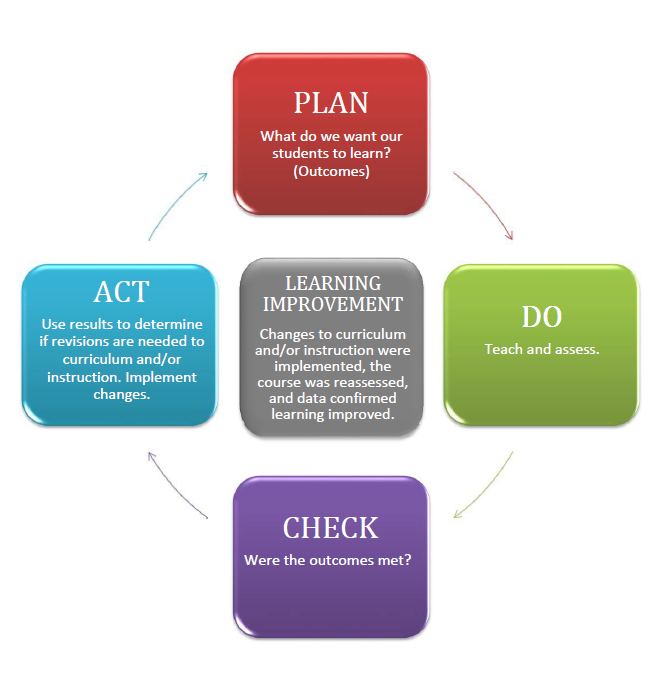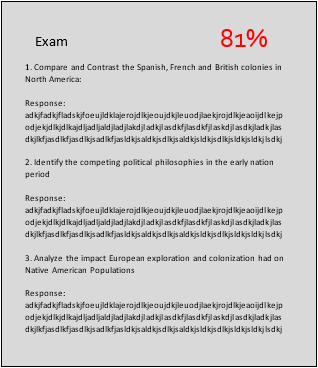
Assessment
Assessment is an on-going process aimed at understanding and improving student learning. It involves making our expectations explicit and public; setting appropriate criteria and high standards for learning quality; systematically gathering, analyzing, and interpreting evidence to determine how well performance matches those expectations and standards; and using the resulting information to document, explain, and improve performance. When it is embedded effectively within larger institutional systems, assessment can help us focus our collective attention, examine our assumptions, and create a shared academic culture dedicated to assuring and improving the quality of higher education.
The American Association for Higher Education (AAHE) Bulletin, 48 (2), November 1995, pp. 7-9.
- Helps us examine our assumptions regarding student learning
- Informs curriculum and instruction
- Creates a shared academic culture dedicated to learning improvement
- Provides evidence to determine whether students have acquired the knowledge, skills and experiences associated with their program or individual courses
The Assessment Cycle

Levels of Assessment
Assessment occurs at many levels throughout a college. We have learning outcomes at the class, course, program and institutional level(s).
| Level | Example | Learning Outcome Achievement |
|---|---|---|
| Student Level Assessment |
Biology 120 CRN 10833 A Student completes an assigned lab report which assesses a course learning outcome. |
Individual student Achievement |
| Class Level Assessment |
Biology 120 CRN 10833 Assessment results of all completed lab reports are aggregated to determine class achievement on a course learning outcome. The faculty member assesses individual student achievement. |
Class Achievement |
| Course Level Assessment |
Members of the Biology faculty review aggregated results across of all sections and modalities of Biology 120 to determine overall outcome achievement in a course. |
Course Achievement |
| Program Level Assessment |
Members of the Biology faculty review aggregated data across all biology courses aligned to Program Learning Outcomes. (Program achievement of program learning outcomes) |
Program Achievement |
| Institutional Level Assessment |
Members of all programs and disciplines review aggregated level assessment of Institutional Learning Outcomes. (Student achievement of institutional learning outcomes across courses and programs) |
Institution Achievement |
Are Assessment and Grading the Same?
Although the terms are closely related, there are some big differences between the terms assessment and grading.
Assessment looks at the learning outcomes to determine acquired knowledge or skills in specific areas.
Grades are typically used to summarize academic quality of a project, assignment or completion of a course. If a student completes an American history course with a final grade of a B, we can assume that the student knows something about American history. However, the grade doesn’t tell us what content the student has mastered.
Example of Assessment vs Grading
Below are outcomes for a United States history course:
1. Compare and contrast the Spanish, French and British colonies in North America.
2. Identify the competing political philosophies in the early nation period.
3. Analyze the impact European exploration and colonization had on Native American Populations.
4. Analyze the causes, course and outcome of the Civil War.
If a student earned a B in this course, would we know if the student was competent in all four outcomes? How could one letter grade explain acquired skills in these specific areas?
Assessment is a tool for faculty to measure the progress of student learning on course outcomes. Grades can be averaged and don’t tell the specific story of strengths or weaknesses. Whereas assessment provides details on specific learning outcomes.

Example: An 81% or a letter grade of a B was earned on the Final Exam above. Although this is an above average grade, we really can’t tell which learning outcomes were met based on this grade.

Example: In assessment we align grading to learning outcomes. In the example above, you can see that this student did fairly well on three of the four course outcomes. It is clear when looking at the questions aligned to the course outcomes that this student did not master outcome 2. When we assess all final exams this way, we may see patterns. If most of the class did very well on outcome 1, this confirms attainment of knowledge. Likewise, if all students struggled with outcome 2, this could inform curriculum and/or instruction methods.

What Type of Research is Assessment?
Assessment is a form of scholarly research, specifically action research. Action research is a “distinct type of research whose purpose is to inform and better one’s own practice rather than make broad generalizations” (Suskie, 2018, p. 11). While action research contains many of the components of scholarly research, many faculty do not have the time to complete empirical studies surrounding student learning. Thus, faculty keep the benefits of assessment in proportion to the time and resources devoted to them.
Adapted from: Suskie, L. (2018). Assessing student learning. San Francisco: John Wiley & Sons, Inc
This page is licensed under a Creative Commons Attribution-Noncommercial 4.0 International License.
Introduction to Assessment for Registered Faculty
If you are a registered Assessment Bootcamp faculty member, complete the Introduction to Assessment before proceeding to Types of Assessment.
Assessment Bootcamp
Now that you have an overview of assessment, the next lesson will cover types of assessment.
